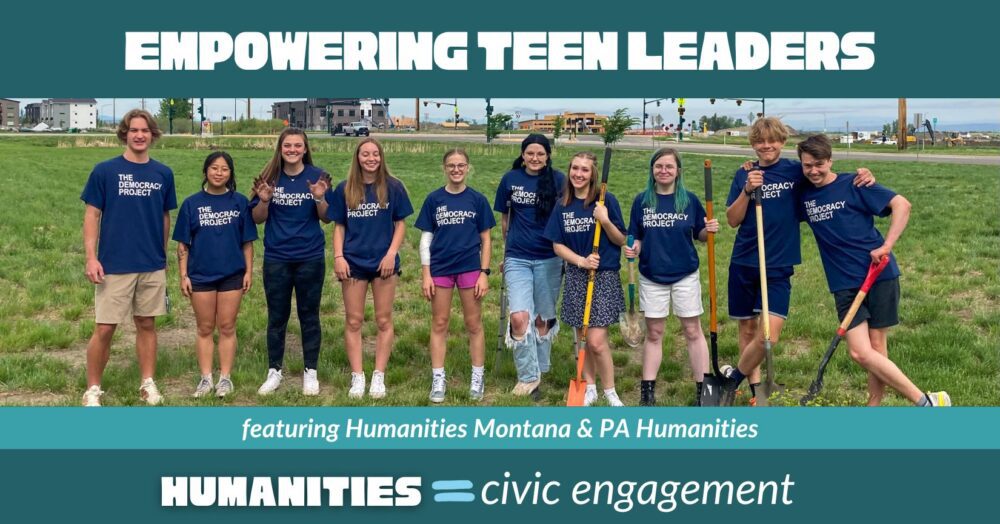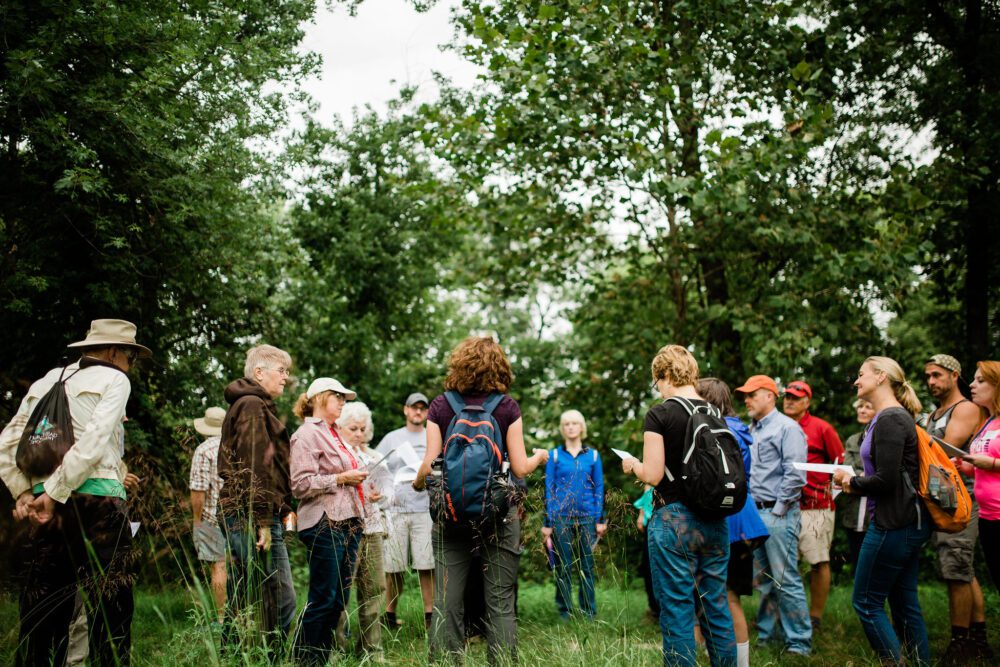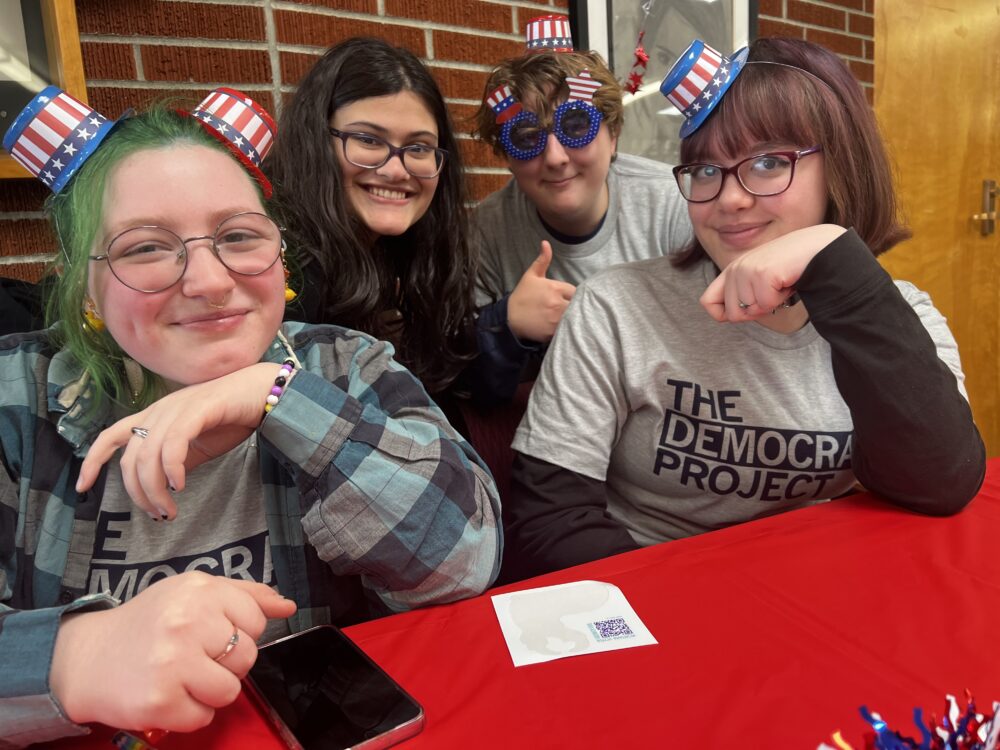Our nation’s 56 state and jurisdictional humanities councils are nonpartisan 501(c)3 nonprofit organizations established in 1971 by Congress to make outstanding public humanities programming accessible to everyday Americans. For over five decades, humanities councils have fulfilled their mission of using federal funds from the National Endowment for the Humanities (NEH) to make humanities programming accessible to every community in their state or territory.
On April 2, every single humanities council received an email from NEH and the Department of Government Efficiency (DOGE) terminating their five-year operating grants, effective immediately and with no option for appeal. Without federal funding, humanities councils will be forced to stop small grant programs that fund museums, libraries, and community initatives and cancel beloved programs that serve children, families, educators, veterans, seniors, and rural Americans.
It can be hard to describe the work of these councils in just a few sentences because they each respond to the unique culture and challenges of their states. Below, we’re sharing just a few examples of how humanities councils serve everyday Americans and support local cultural infrastructure.
States featured in this article: Virginia | Kentucky | West Virginia | Arkansas | Rhode Island
If you are a journalist or producer and would like to learn more about any of these stories or be connected with humanities councils and their grantees, please contact the Federation at connect[at]statehumanities.org.
Virginia Humanities runs a folklife apprenticeship program that preserves the state’s many cultural traditions and passes down its intangible heritage
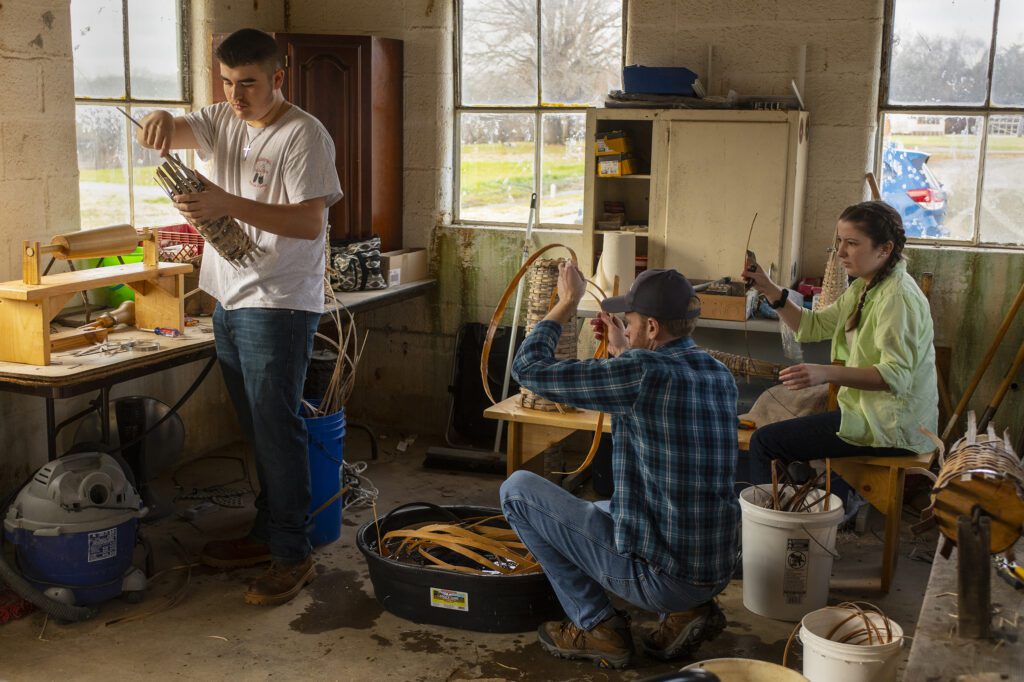
The Virginia Folklife Program was established in 1989 as part of Virginia Humanities, the state humanities council, with ongoing funding support from the Virginia Commission for the Arts and the National Endowment for the Arts. (All NEH funding to Virginia Humanities was terminated abruptly on April 2.) In 2002, the program was expanded to include a Folklife Apprenticeship Program, which provides funding for an individual who is considered a master of a tradition to train an apprentice of their choosing.
Since its creation, Virginia Humanities’ Folklife Apprenticeship Program has supported 147 teams from a wide range of communities and traditions by providing funding for a year-long, self-designed learning experience and a platform to share their work with the wider public. It has supported traditions as wide-ranging as custom car bodywork, draft horse training, different kinds of cooking, baking and preserving, gunsmithing, auctioneering, instrument building, along with music-making and dancing in styles as wide-ranging and diverse as Virginia’s communities.
In this photo, Brad Hatch, a Patawomeck archeologist and mentor artist, builds eel pots from white oak strips with his apprentices Reagan Andersen and David Onks at the Patawomeck Museum and Cultural Center in Fredericksburg. In 2022, Hatch was the only member of the Patawomeck Indian Tribe who knew how to make a traditional eel pot from start to finish. Thanks to the year-long apprenticeship program, he was able to pass along this knowledge to two other tribal members. That year, Virginia Humanities further supported the preservation of this knowledge and craft by awarding a grant to the Patawomeck Tribe to support a series of public eel pot workshops hosted by Hatch.
The West Virginia Humanities Council also runs a folklife apprenticeship program, and other humanities councils around the country support folklife and folkways through programming and grants.
Learn more about Virginia Humanities.
Kentucky Humanities brings engaging speakers and free books to schools around the state to support a culture of reading
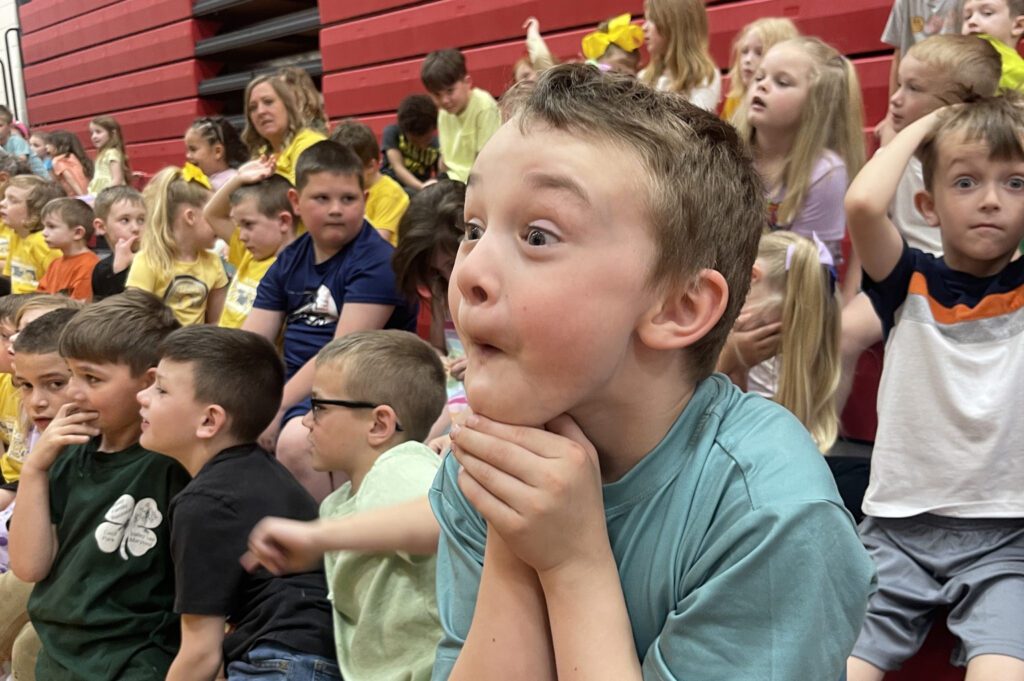
Kentucky Humanities at the Schools is a student outreach program of the Kentucky Book Festival, organized every year by Kentucky Humanities. The program brings authors and speakers to dozens of schools across the state to meet students in an exciting, interactive learning experience—all at no cost to schools.
In 2025, twenty-seven schools were selected to receive an author/speaker sponsored by Kentucky Humanities. The speakers vary from picture book authors to storytellers and presenters from the Kentucky Humanities Speakers Bureau. During the visits, speakers meet with an assembly of students and present on a topic or engage the students in an interactive learning experience. If the speaker is a children’s author, Kentucky Humanities may purchase a set of books as a gift for the library of the school. Twelve of the selected schools will also receive personalized books by the visiting author for all children in attendance.
As of April 2024, over 700 students in grades K-12 have been reached through the Kentucky Humanities at the Schools program, and 435 students have received personalized books to take home as gifts. In this photo, students at Roby Elementary in Shepherdsville, Kentucky, react to their visiting speaker from Kentucky Humanities at the Schools.
Jessica Stepp, the library media specialist at Clearfield Elementary in rural Rowan County, had this to say about hosting Kentucky Humanities at the Schools: “We have worked really hard to build a culture of reading this year in our school…The students have enjoyed this so much, and I’ve already had one asking while standing in line ‘Ms. Stepp, when can we do this again,’ so we appreciate the opportunity to do this so much.”
Rachel Burgin, a teacher at Henry County High School in New Castle, said this about the program: “It was wonderful having the storyteller here. Miss Hamilton really helped a lot of our students understand how to succeed in the creative arts world and our gifted and talented students all loved hearing her stories and were really impacted by what she had to say.”
Many humanities councils—including those in Utah, Tennessee, Maryland, and South Dakota—put on book festivals and state-wide reads to engage students and adults alike in the joy of reading.
Learn more about Kentucky Humanities.
West Virginia Humanities Council grants supported the growth of the West Virginia Mine Wars Museum, which preserves local history and draws cultural tourists to its small town
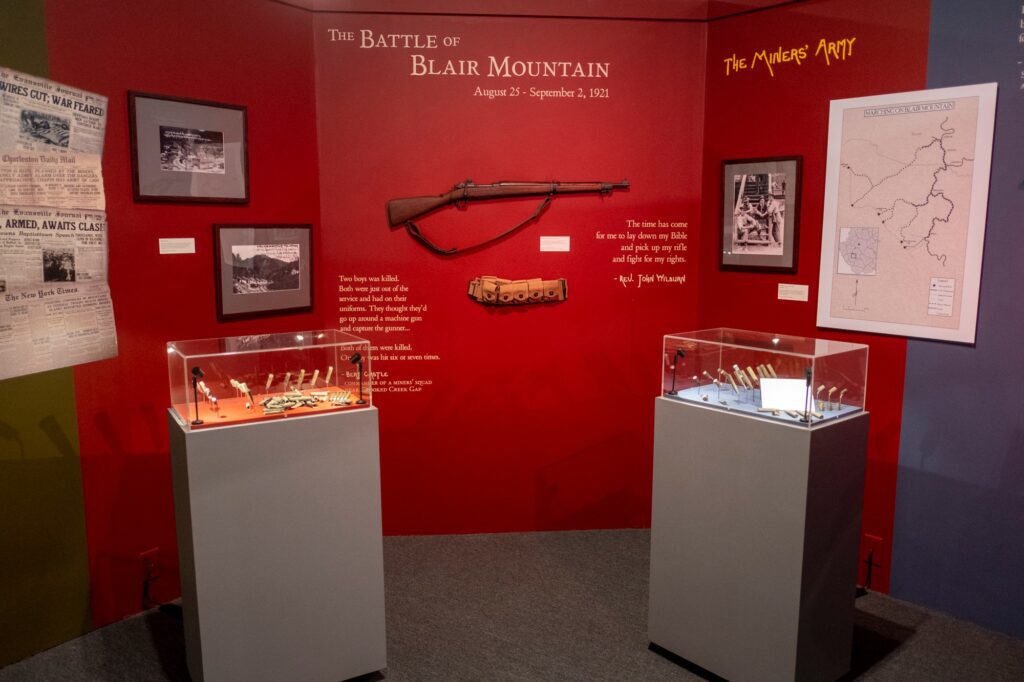
The West Virginia Humanities Council has given several grants to the West Virginia Mine Wars Museum over the years, funding various exhibits as well as a conference, videos, education outreach programs, a planning project, and a lecture/discussion series. Located in the small town of Matewan, the West Virginia Mine Wars Museum tells the story of a historic battle that erupted in the town in May of 1920, setting into motion a chain of events that led to the largest armed uprising in the United States since the Civil War. The West Virginia Mine Wars Museum preserves and uplifts the voices of the people who lived these stories of sacrifice, violence, and triumph.
West Virginia Humanities Council Executive Director Eric Waggoner says he loves sharing the council’s support of the Mine Wars Museum as an example of how humanities councils use federal funds to support culture in their states: “The museum has helped to turn the (very small) town of Matewan into a true destination site for cultural tourists, researchers, and West Virginians interested in our unique history, as well as the history of the American labor movement,” explains Waggoner. “Its collection houses not only primary documents, but copious material artifacts of the Mine Wars, including weapons/ammunition, publications, personal items, and more. These are indexed, housed on-site, and displayed on a rotating basis at the museum for perusal by visitors and researchers.”
“The West Virginia Humanities Council’s support of the Mine Wars Museum represents clear and unmistakable evidence of state humanities councils’ long-term impact on communities around their state—we help to build things that far outlast the period of performance of the grant. The Mine Wars Museum is in its tenth year now and has amassed a very impressive track record of original programming, research, curation, archaeological restoration, outside grant awards from a variety of sources, and positive impact on the town itself. The Mine Wars Museum is first-rate public history, locally designed and locally executed by members of the community who are qualified and professionally equipped to sustain the institution well into its future. We love being a part of that through our grantmaking, as well as through partnership with the Mine Wars Museum at historical conferences and panels.”
Grant-making is a core function of most humanities councils, although many have had to pause grant-making since their federal funds from the National Endowment for the Humanities were terminated abruptly on April 2. Before the cuts, humanities councils together distributed an average of 3,500 small grants each year to community organizations and projects.
Learn more about the West Virginia Humanities Council.
HumanitiesAR created a humanities career conference to help students and young professionals find meaningful work connected to their studies

In 2023, HumanitiesAR, the humanities council of Arkansas, hosted their first Next Gen(eration) Humanities Conference to bridge the gap between humanities education and career paths for 18–35-year-olds. Sessions, tours, and workshops explored career development, multigenerational learning and collaboration, and careers in the humanities. The conference was a success and returned for a second year in 2024. Unfortunately, due to the sudden termination of funding for humanities councils in April 2025, plans for a third Next Gen(eration) Humanities Conference have been put on hold.
Learn more about HumanitiesAR.
Rhode Island Humanities grants support small community nonprofits in the state, fostering accessible spaces for creativity and learning
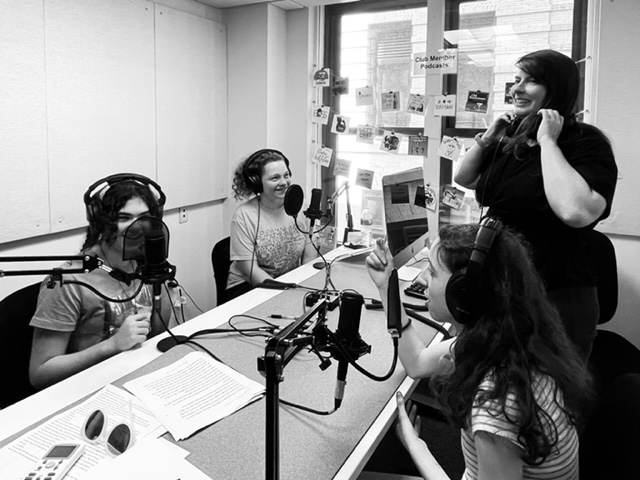
LitArts RI is one of many small Rhode Island nonprofits that have received grants from Rhode Island Humanities in recent years. For many small humanities and culture nonprofits, these small grants are transformative. Small grants from humanities councils provide a path to growth for nonprofits that may be too small to get the attention of larger funders. They also demonstrate credibility, helping these small community organizations raise their profile and attract more local investment beyond the councils.
LitArts RI is a non-profit in Providence that supports Rhode Island’s creators of the written, spoken, and illustrated word through community events, free and low-cost business services, and creative workspace. In this photo, a group of homeschoolers records a project in LitArts RI’s podcast studio.
In response to the termination of federal funds for humanities councils in April 2025 and the resulting pause of so many council grant programs, LitArts RI’s Executive Director, Christina Bevilacqua, had this to say:
“Without the possibility of grant funding, we all stay in our lanes, we take on a ‘scarcity’ mindset and retreat, we see ourselves as part of an ecosystem that is only competitive, not collaborative. So what we lose is the ability to think expansively and creatively, to collaborate and create partnerships, and to cultivate new possibilities and opportunities for the people in our communities.”

